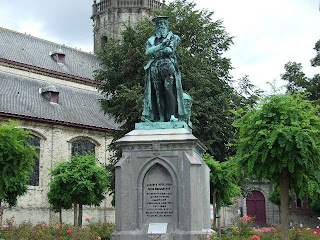It's Hard to Find on a Map
As we pedaled along the Schelde
River from Temse toward Antwerp, our guide Rolf (who
was familiar with Belgian roads but not its history) brought us to a stop in
tiny Rupelmonde. We had just bumped over a cobblestone path leading into the
town and were glad to stop and literally rest our butts.
Rolf noted that there was little of interest in this town
except for a statue that dominated a square in front of an impressive old church. The statue featured a bearded Renaissance scholar holding some charts in his hand.
We were too far away to read the plaque below the figure.
Looking behind me, I
spotted a second statue, much smaller and rudely dwarfed by an electrical
repair truck that, incongruously, featured an American flag. The small statue
bore a plate reading “Jonge Mercator.” It was easy to figure out what “jonge”
meant—young. But “Mercator”? Perhaps this small town, which barely rated a
place on a map of Flanders, was some kind of
haven for mapmakers.
Then Rolf solved the mystery by explaining that Rupelmonde
was the birthplace of the famed cartographer Gerardus Mercator—the man who coined
the term “atlas” for a book of maps and was one of the first to superimpose
parallel lines of longitude on his maps to help sailors plot their courses across
the seas. [How do I know all of this? Wikipedia, of course.] What he didn’t
explain (or perhaps didn’t realize) was that 2012 was the 500th anniversary
of Mercator’s birth in Rupelmonde, and that Belgium was celebrating that birth
throughout the country. There was even a big Mercator map exhibit in one of the
major museums in Brussels.
Ironically, Rupelmonde didn’t seem caught up in the “Mercator
madness” or had chosen to stay low-key about its most famous son. There were no
banners, no posters, and surprisingly no souvenir stands. You can’t picture an
American town (or even most European ones) acting this way. I later read that
Rupelmonde had celebrated on March 4, Mercator’s birthdate, but that was nearly five months before, and the “furor” had obviously died down. We bikers would
certainly have enjoyed celebrating with some birthday cake featuring Belgian
chocolate!
Why am I going on so long about all of this? Mostly because
I felt Mercator and his birthplace deserved more respect from our biking party,
and I feel bad about the way we treated him. Of course, I’m just as annoyed by
the way the town was treating the statue of the Jonge Mercator. And I want to
apologize to both the young and the old Mercator. Sometimes Jewish males have
to invent reasons to feel guilty.


No comments:
Post a Comment